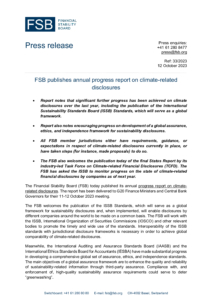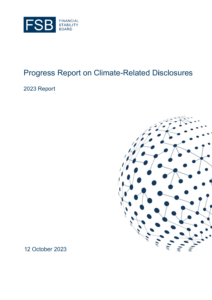This report describes firms’ progress in making climate-related financial disclosures and highlights some of the challenges they face in making such disclosures, including challenges with incorporating climate-related risks into their financial statements. In addition, it provides insights on asset managers’ and asset owners’ TCFD-aligned reporting practices. The report also provides an update on significant actions by governments, regulators, and standard setters to use the TCFD recommendations in developing climate-related disclosure requirements.
More specifically, the report finds that:
-
The percentage of companies disclosing TCFD-aligned information continues to grow, but more progress is needed. For fiscal year 2022 reporting, 58% of companies disclosed in line with at least five of the eleven recommended disclosures – up from 18% in 2020; however, only 4% of companies disclosed in line with all eleven recommendations.
-
The percentage of companies reporting on climate-related risks or opportunities, board oversight, and climate-related targets increased significantly between fiscal years – by 26, 25, and 24 –percentage points, respectively. Between fiscal years 2020 and 2022.
-
The majority of jurisdictions with final or proposed climate-related disclosure requirements specify that such disclosures be reported in financial filings or annual reports.
-
Over 80% of the largest asset managers and 50% of the largest asset owners reported in line with at least one of the 11 recommended disclosures. Based on a review of publicly available reports, nearly 70% of the top 50 asset managers and 36% of the top 50 asset owners disclosed in line with at least five of the recommended disclosures.
Based on a 2022 TCFD survey, asset managers and asset owners indicated the top challenge to climate-related reporting is insufficient information from investee companies. Asset managers highlighted information from public companies as most challenging (62%), while asset owners identified information on private investments (84%).The report also reflects on the TCFD’s work over the past eight years, and highlights areas that warrant continued focus or further work by the ISSB or other appropriate bodies, including:
-
Ensuring interoperability of the ISSB Standards with jurisdictional frameworks to support consistent company reporting across jurisdictions and avoid the need for companies to report through multiple venues.
-
Developing implementation guidance on topics such as climate-related physical risk assessment and adaptation planning, climate-related scenario analysis at a sector or industry level, and Scope 3 GHG emissions measurement at a sector or industry level.
-
Continuing to focus on companies’ disclosure of the resilience of their strategies under different climate-related scenarios, including a climate-related scenario aligned with the latest international agreement on climate change.
-
Continuing to focus on decision-useful disclosures on other sustainability topics – such as biodiversity, water, and social issues – and consideration of the linkages between climate-related and other sustainability issues (for example, in the context of companies’ transition plans).
Developing a consistent climate-related financial disclosure framework for use by countries and other sovereign entities.

